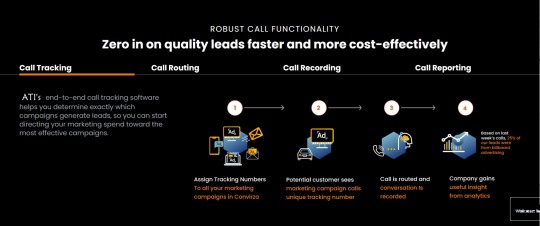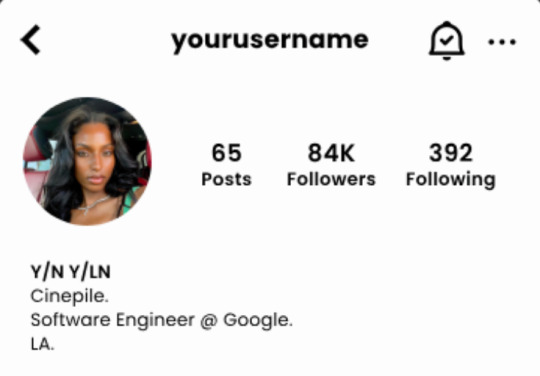#Call Tracking Software for Marketing
Explore tagged Tumblr posts
Text
Auto Technologies Inc.
Marketing Agency

Marketing Agency
Address- 7500 College Blvd., Overland Park, KS, USA 66210
Phone- +1 866-673-5476
Email- [email protected]
Website- https://aticalltracking.com
Unlock the power of data-driven decision-making with our comprehensive Call and Advertising Tracking Services. Elevate your marketing strategies by gaining unparalleled insights into customer interactions and campaign performance.
Key Features:
1. In-Depth Analytics: Track and analyze every customer call to understand the effectiveness of your advertising efforts. Gain valuable insights into caller demographics, preferences, and behavior.
2. ROI Measurement: Quantify the return on investment for your advertising campaigns with precision. Our services provide detailed metrics on the success of your marketing initiatives, enabling you to allocate resources effectively.
3. Dynamic Number Insertion: Implement dynamic number insertion to seamlessly track calls originating from various advertising channels. Know exactly which ads are driving customer engagement and conversions.
4. Keyword-Level Tracking: Pinpoint the keywords that generate phone calls. Optimize your advertising strategy by focusing on high-performing keywords and eliminating those that don't contribute to call volume.
5. Real-Time Monitoring: Stay informed in real-time with live monitoring of incoming calls. React promptly to campaign performance and make adjustments on the fly for maximum impact.
6. Multichannel Visibility: Whether it's online or offline advertising, our services provide a unified platform for tracking calls across multiple channels. Understand the holistic impact of your marketing efforts.
7. Call Recording: Enhance customer service and training by recording and analyzing customer calls. Gain insights into customer feedback, identify pain points, and refine your advertising approach accordingly.
8. Location-Based Tracking: Understand the geographical reach of your advertising campaigns. Identify regions where your ads are most effective and tailor your strategy to target specific locations.
Empower your business with a comprehensive solution that bridges the gap between advertising and customer engagement. Our Call and Advertising Tracking Services revolutionize the way you measure, analyze, and optimize your marketing efforts, ensuring every call contributes to the growth and success of your business.
Business Hours- Mon - Fri: 9AM - 5PM
Payment Methods- All forms of payment accepted CC, Amex, Discover, Paypal, Venmo, Check, Wire
Year Est- 2002
Owner Name- Roberta Long
Follow On:
Facebook- https://www.facebook.com/autotechnologies
Twitter- https://twitter.com/autotechnologie
LinkedIn- https://www.linkedin.com/in/autotechnologies/







#Advertising Call Tracking#Call Monitoring for Ads#Campaign Call Analytics#Customer Call Tracking#Ad Performance Metrics#Call Attribution for Advertising#Inbound Call Monitoring#Outbound Call Analytics#Call Tracking Software for Marketing#ROI Tracking for Calls#Keyword-Level Call Monitoring#Ad Campaign Call Metrics#Call Conversion Tracking#Ad Response Tracking#Click-to-Call Analytics#Multichannel Ad Tracking#Lead Source Call Monitoring#Real-time Ad Call Tracking#Ad Impressions Call Metrics#Ad Spend ROI Analysis#Dynamic Number Insertion for Ads#Location-based Ad Call Tracking#Call Recording for Advertising#Customer Interaction Analytics#Offline Conversion Tracking for Ads
1 note
·
View note
Text
#leadsrain#call center software#Pay-per-call marketing#Call tracking technology#Pay-per-call networks#Benefits of pay-per-call
0 notes
Text
pro-builder.cloud/get-started
#email marketing#sms marketing#unlimited sales funnels#call tracking#surveys and forms#appointment booking#crm software#analytics#no code website builder
1 note
·
View note
Text
#email marketing#sms marketing#unlimited sales funnels#call tracking#surveys and forms#appointment booking#crm software#analytics#no code website builder#yemen
1 note
·
View note
Text
Free or Cheap Spanish Learning Resources So You Can Run at Windmills in Fluent Spanish
I will update this list as I learn of any more useful ones. If you want general language learning resources check out this other post. This list is Spanish specific. Find lists for other specific languages here.
For the purposes of this list "free" means something that is either totally free or has a useful free tier. "Cheap" is a subscription under $10USD a month, a software license or lifetime membership purchase under $100USD, or a book under $30USD. If you want to suggest a resource for this list please suggest ones in that price range that are of decent quality and not AI generated.
WEBSITES
Dreaming Spanish - A website that is also a YouTube Channel. This is a comprehensible input site with videos about a variety of subjects with multiple hosts from multiple countries. It has content for learners from absolute beginner to lower advanced. It lets you sort videos by dialect, subject, length, etc. The free version has a lot of content. The paid version is $9 a month and has many more videos and allows you to track your listening hours. The website is in English but all videos are entirely in Spanish.
Lawless Spanish - A free website with resources to learn Spanish relating to grammar, pronunciation, and vocabulary. The website also has worksheets, charts, an AI chatbot, and reviews of different learning resources. The website is in English.
Spanish Boom - A free website with beginner lessons and free readings with audio and visual aids. They're also associated with a service called Esidioma that provides paid courses with tutor help for around $23 and also sells books. Prices are in Euros but they also sell to people outside of Europe. The website is available in multiple languages.
studyspanish.com - A website with free verb drills and grammar lessons. It's commonly used by high school Spanish students. They also have a blog that hasn't updated in a while but there is an archive to read through. They have a paid tier with access to their podcasts, vocab lessons, and their Spanish learning app which is $10 a month or $120 for a lifetime membership. The website is in English.
Speaking Latino - A website marketed at Spanish teachers but it's in English and has guides to colloquial Spanish and slang in a lot of different countries and a free blog with tips on sounding like a local in different countries. It has a paid tier but that's mostly useful for Spanish teachers. They also sell slang dictionaries for various countries that are usually less than $10.
UT Austin Spanish Proficiency Exercises - A bunch of free grammar, vocab, and pronunciation guides for various tasks you should be able to do in Spanish at various levels from one of my alma maters, the University of Texas at Austin. It's got videos of people from different countries pronouncing things. The podcast links often don't work for some reason but the grammar, vocab, and video links should work fine. The website is in English.
SpanishDict - A free dictionary website and app with a search feature that also has curated vocabulary lists on various topics and articles. They have a paid tier at $13 a month with a writing coach and subscriber only curated lists and articles. Personally I don't think their paid tier is all that special but it's up to you. The website is in English.
BBC Bitesize Spanish - Bitesize is a free study resource for kids and is sorted by level. It has articles aimed at little kids as well as secondary school aged teens studying for their exams or planning to study abroad. The website is in English and available worldwide, not just in the UK.
YOUTUBE CHANNELS
Hola Spanish - A channel by a woman named Brenda from Argentina who makes videos about grammar, pronunciation, culture, media, and general Spanish tips for upper beginner to advanced learners. The channel is almost entirely in Spanish with occasional vocabulary words translated into English onscreen. There are subtitles in Spanish onscreen but sometimes they randomly disappear.
Butterfly Spanish - A channel with free lessons from beginner to lower intermediate. The host also makes videos about useful phrases and listening practice videos. The channel is mostly in English.
Spanish After Hours - A comprehensible input channel for beginner to intermediate learners with vlogs, history, Spanish tips, and news. The descriptions and video titles are in English but the videos are all in Spanish. The channel host is from Spain.
Easy Spanish - A channel part of the easy languages network that makes a combination of videos with useful phrases and terms for beginners and interviews on the street with locals. They have teams in both Barcelona and Mexico City and there are dual language subtitles in Spanish and English onscreen. The hosts also have a podcast for intermediate to advanced learners.
My Daily Spanish - A catchall channel that has lessons, discussions of grammar, culture topics, vlogs, vocabulary, and other various things. The host is from Spain and also makes a lot of YouTube shorts. She mostly speaks in Spanish but occasionally uses English or has English translations onscreen.
Spansh Boost with Martin and Spanish Boost with Mila - These channels are run by a couple from Argentina who also work as tutors on italki. They often appear on each other's channels and both have their own podcasts and vlogs and general content videos that they make discussing their lives, giving tips, and discussing culture. Mila also makes a lot of videos playing the sims.
Spanish Boost Gaming - Run by Martin from Spanish Boost, this is a lets play channel in clear and easy to understand Spanish. Subtitles are available in English and Spanish and a few other languages as well and it's an actual let's play channel. He plays a variety of video games, makes jokes, and says cuss words and everything.
Mextalki - A channel run by a couple of guys from Mexico city that has listening practice, podcasts, street interviews, and Mexican Spanish specific lessons. Some videos have dual language subtitles onscreen while others do not. The channel is majority in Spanish but in a few lesson videos or portions of videos they will speak in English a bit.
Espanol Con Juan - A channel that teaches Spanish in Spanish from upper beginner to upper intermediate. Juan has grammar lessons, vocabulary lessons, and videos about culture. He is from Spain and the channel is entirely in Spanish. He also has a podcast for more advanced learners.
READING PRACTICE
Vikidia - A wikipedia type website specifically made for kids. The articles are short and written in more simple easy to understand Spanish. The website is in Spanish and made for native speaker kids.
Spanish graded readers by Olly Richards - Spanish has short stories and dialogues for beginner and intermediate, books in easy Spanish on world war 1, world war 2, western philosophy, and climate change. There's also dialogue books specific to Mexican Spanish and Spanish used on social media. The books usually go from $5-$20 new depending on how old they are and whether or not you bought a digital copy. These are really easy to find at used bookstores for cheap though, especially in the US.
Conatilteg Digital - This is a mobile app that provides digital versions of the free textbooks for children provided by the Mexican Ministry of Education both historic and current. The link I provided is for iOS but the app is also available on android and the app is available in multiple countries and not just Mexico. The app is entirely in Spanish and categorized by grade from preschool to secondary school so it's a resource appropriate for all levels and may be enjoyable for any kids you know that are learning Spanish. You can also view their browser website here. (also entirely in Spanish)
Hola Que Pasa - A free website with news articles for learners from beginner to intermediate difficulty. They also provide audio and have the news articles available in podcast form. Every article has certain phrases highlighted that you can hover over and get and English translation of. The website is in a mix of English and Spanish.
Spanish in Levels - A world news website in Spanish for learners. The articles are separated into three different levels and the website is in a mix of English and Spanish. Each article also has audio.
PODCASTS
Spanish for False Beginners - An unscripted podcast about various topics hosted by a guy from the UK and a guy from Spain. The podcast is aimed at people who find beginner content to be boring but still find intermediate content to be too difficult. English is very rarely used.
Uforia/Univision - Uforia is a free app aimed at native speakers in the US and has Spanish language radio, music, and podcasts. Univision in general is also useful if you like American and international news and programming in Spanish.
Radio National de Espana - Another site for native speakers, this is Spanish National Radio. They have a variety of free podcasts and radio programs.
Spanish Obsessed - This is a series of lessons in podcast form for learners from absolute beginner to advanced.
Storylearning Spanish Podcast - This podcast tells different short stories in Spanish and is aimed at upper beginner to lower intermediate learners.
Radio Ambulante - A Spanish language podcast from NPR that's similar to something like This American Life that tells stories from around Latin America. Although it's aimed at native speakers, the language used is clear and understandable and transcripts are available. They're also aware that a lot of intermediate and advanced learners use them for listening practice and they have developed a free app that helps with comprehension and vocabulary when listening to their podcast.
SELF STUDY TEXTBOOKS
Madrigal's Magic Key to Spanish - A self study textbook written in the late 80s that still mostly holds up for beginner to upper beginner Spanish. A paperback edition of the textbook is about $25 and used copies and ebooks are also usually available wherever you like to buy books. It's also half off on Amazon pretty often.
Complete Spanish step-by-step by Mcgraw Hill - This is a complete version of the McGraw Hill budget option, the spanish step by step series that focuses on the most frequently used words and grammar. It's $25 new but the individual books in the series usually cost less than $10 and used versions and ebooks are available.
Complete Spanish Grammar from Mcgraw Hill - This is a workbook as well as a textbook that usually costs around $20. The complete Spanish all in one version of the book costs about $40. Used versions of these books can be difficult to find because people tend to write all over them but ebook versions are available. You can also find their beginner workbook for around $18.
Practical Spanish Grammar - This book is usually around $25 but because it's not a workbook it's fairly easy to find used copies. An advanced grammar textbook is also available.
SERIES FOR LEARNERS AND KIDS SHOWS
Destinos - This is a series of over 50 episodes of a telenovela made for Spanish learners. The plot revolves around a group of siblings searching around the world for their long lost half sibling they just learned that they had so the series includes a lot of different Spanish dialects.
Extra Spanish - A 13 episode sitcom made to show in Spanish classrooms that revolves around a group of friends in Spain and a student that just moved there.
Dora la Expladora - Yeah if you remember Dora the Explorer from your preschool days it also unsurprisingly exists in Spanish. You can watch clips and some full episodes on YouTube and buy full seasons for around $8 each on Amazon.
PBS Kids in Spanish - A few PBS Kids shows like Cyberchase and Daniel Tiger have been dubbed into Spanish. The link I've given goes to a place to buy them on Amazon Prime but if you go digging on their YouTube channel or the PBS Kids website you also might be able to find them for free. They don't always make it easy to find though.
Plaza Sésamo - The Spanish language localization of Sesame Street for Mexican audiences with its own unique characters. The YouTube channel has a huge amount of content on it and often has episodes streaming live.
443 notes
·
View notes
Text
Epic Systems, a lethal health record monopolist

Epic Systems makes the dominant electronic health record (EHR) system in America; if you're a doctor, chances are you are required to use it, and for every hour a doctor spends with a patient, they have to spend two hours doing clinically useless bureaucratic data-entry on an Epic EHR.
How could a product so manifestly unfit for purpose be the absolute market leader? Simple: as Robert Kuttner describes in an excellent feature in The American Prospect, Epic may be a clinical disaster, but it's a profit-generating miracle:
https://prospect.org/health/2024-10-01-epic-dystopia/
At the core of Epic's value proposition is "upcoding," a form of billing fraud that is beloved of hospital administrators, including the "nonprofit" hospitals that generate vast fortunes that are somehow not characterized as profits. Here's a particularly egregious form of upcoding: back in 2020, the Poudre Valley Hospital in Ft Collins, CO locked all its doors except the ER entrance. Every patient entering the hospital, including those receiving absolutely routine care, was therefore processed as an "emergency."
In April 2020, Caitlin Wells Salerno – a pregnant biologist – drove to Poudre Valley with normal labor pains. She walked herself up to obstetrics, declining the offer of a wheelchair, stopping only to snap a cheeky selfie. Nevertheless, the hospital recorded her normal, uncomplicated birth as a Level 5 emergency – comparable to a major heart-attack – and whacked her with a $2755 bill for emergency care:
https://pluralistic.net/2021/10/27/crossing-a-line/#zero-fucks-given
Upcoding has its origins in the Reagan revolution, when the market-worshipping cultists he'd put in charge of health care created the "Prospective Payment System," which paid a lump sum for care. The idea was to incentivize hospitals to provide efficient care, since they could keep the difference between whatever they spent getting you better and the set PPS amount that Medicare would reimburse them. Hospitals responded by inventing upcoding: a patient with controlled, long-term coronary disease who showed up with a broken leg would get coded for the coronary condition and the cast, and the hospital would pocket both lump sums:
https://pluralistic.net/2024/06/13/a-punch-in-the-guts/#hayek-pilled
The reason hospital administrators love Epic, and pay gigantic sums for systemwide software licenses, is directly connected to the two hours that doctors spent filling in Epic forms for every hour they spend treating patients. Epic collects all that extra information in order to identify potential sources of plausible upcodes, which allows hospitals to bill patients, insurers, and Medicare through the nose for routine care. Epic can automatically recode "diabetes with no complications" from a Hierarchical Condition Category code 19 (worth $894.40) as "diabetes with kidney failure," code 18 and 136, which gooses the reimbursement to $1273.60.
Epic snitches on doctors to their bosses, giving them a dashboard to track doctors' compliance with upcoding suggestions. One of Kuttner's doctor sources says her supervisor contacts her with questions like, "That appointment was a 2. Don’t you think it might be a 3?"
Robert Kuttner is the perfect journalist to unravel the Epic scam. As a journalist who wrote for The New England Journal of Medicine, he's got an insider's knowledge of the health industry, and plenty of sources among health professionals. As he tells it, Epic is a cultlike, insular company that employs 12.500 people in its hometown of Verona, WI.
The EHR industry's origins start with a GW Bush-era law called the HITECH Act, which was later folded into Obama's Recovery Act in 2009. Obama provided $27b to hospitals that installed EHR systems. These systems had to more than track patient outcomes – they also provided the data for pay-for-performance incentives. EHRs were already trying to do something very complicated – track health outcomes – but now they were also meant to underpin a cockamamie "incentives" program that was supposed to provide a carrot to the health industry so it would stop killing people and ripping off Medicare. EHRs devolved into obscenely complex spaghetti systems that doctors and nurses loathed on sight.
But there was one group that loved EHRs: hospital administrators and the private companies offering Medicare Advantage plans (which also benefited from upcoding patients in order to soak Uncle Sucker):
https://www.ncbi.nlm.nih.gov/pmc/articles/PMC8649706/
The spread of EHRs neatly tracks with a spike in upcharging: "from 2014 through 2019, the number of hospital stays billed at the highest severity level increased almost 20 percent…the number of stays billed at each of the other severity levels decreased":
https://oig.hhs.gov/oei/reports/OEI-02-18-00380.pdf
The purpose of a system is what it does. Epic's industry-dominating EHR is great at price-gouging, but it sucks as a clinical tool – it takes 18 keystrokes just to enter a prescription:
https://jamanetwork.com/journals/jamanetworkopen/fullarticle/2729481
Doctors need to see patients, but their bosses demand that they satisfy Epic's endless red tape. Doctors now routinely stay late after work and show up hours early, just to do paperwork. It's not enough. According to another one of Kuttner's sources, doctors routinely copy-and-paste earlier entries into the current one, a practice that generates rampant errors. Some just make up random numbers to fulfill Epic's nonsensical requirements: the same source told Kuttner that when prompted to enter a pain score for his TB patients, he just enters "zero."
Don't worry, Epic has a solution: AI. They've rolled out an "ambient listening" tool that attempts to transcribe everything the doctor and patient say during an exam and then bash it into a visit report. Not only is this prone to the customary mistakes that make AI unsuited to high-stakes, error-sensitive applications, it also represents a profound misunderstanding of the purpose of clinical notes.
The very exercise of organizing your thoughts and reflections about an event – such as a medical exam – into a coherent report makes you apply rigor and perspective to events that otherwise arrive as a series of fleeting impressions and reactions. That's why blogging is such an effective practice:
https://pluralistic.net/2021/05/09/the-memex-method/
The answer to doctors not having time to reflect and organize good notes is to give them more time – not more AI. As another doctor told Kuttner: "Ambient listening is a solution to a self-created problem of requiring too much data entry by clinicians."
EHRs are one of those especially hellish public-private partnerships. Health care doctrine from Reagan to Obama insisted that the system just needed to be exposed to market forces and incentives. EHRs are designed to allow hospitals to win as many of these incentives as possible. Epic's clinical care modules do this by bombarding doctors with low-quality diagnostic suggestions with "little to do with a patient’s actual condition and risks," leading to "alert fatigue," so doctors miss the important alerts in the storm of nonsense elbow-jostling:
https://www.ncbi.nlm.nih.gov/pmc/articles/PMC5058605/
Clinicians who actually want to improve the quality of care in their facilities end up recording data manually and keying it into spreadsheets, because they can't get Epic to give them the data they need. Meanwhile, an army of high-priced consultants stand ready to give clinicians advise on getting Epic to do what they need, but can't seem to deliver.
Ironically, one of the benefits that Epic touts is its interoperability: hospitals that buy Epic systems can interconnect those with other Epic systems, and there's a large ecosystem of aftermarket add-ons that work with Epic. But Epic is a product, not a protocol, so its much-touted interop exists entirely on its terms, and at its sufferance. If Epic chooses, a doctor using its products can send files to a doctor using a rival product. But Epic can also veto that activity – and its veto extends to deciding whether a hospital can export their patient records to a competing service and get off Epic altogether.
One major selling point for Epic is its capacity to export "anonymized" data for medical research. Very large patient data-sets like Epic's are reasonably believed to contain many potential medical insights, so medical researchers are very excited at the prospect of interrogating that data.
But Epic's approach – anonymizing files containing the most sensitive information imaginable, about millions of people, and then releasing them to third parties – is a nightmare. "De-identified" data-sets are notoriously vulnerable to "re-identification" and the threat of re-identification only increases every time there's another release or breach, which can used to reveal the identities of people in anonymized records. For example, if you have a database of all the prescribing at a given hospital – a numeric identifier representing the patient, and the time and date when they saw a doctor and got a scrip. At any time in the future, a big location-data breach – say, from Uber or a transit system – can show you which people went back and forth to the hospital at the times that line up with those doctor's appointments, unmasking the person who got abortion meds, cancer meds, psychiatric meds or other sensitive prescriptions.
The fact that anonymized data can – will! – be re-identified doesn't mean we have to give up on the prospect of gleaning insight from medical records. In the UK, the eminent doctor Ben Goldacre and colleagues built an incredible effective, privacy-preserving "trusted research environment" (TRE) to operate on millions of NHS records across a decentralized system of hospitals and trusts without ever moving the data off their own servers:
https://pluralistic.net/2024/03/08/the-fire-of-orodruin/#are-we-the-baddies
The TRE is an open source, transparent server that accepts complex research questions in the form of database queries. These queries are posted to a public server for peer-review and revision, and when they're ready, the TRE sends them to each of the databases where the records are held. Those databases transmit responses to the TRE, which then publishes them. This has been unimaginably successful: the prototype of the TRE launched during the lockdown generated sixty papers in Nature in a matter of months.
Monopolies are inefficient, and Epic's outmoded and dangerous approach to research, along with the roadblocks it puts in the way of clinical excellence, epitomizes the problems with monopoly. America's health care industry is a dumpster fire from top to bottom – from Medicare Advantage to hospital cartels – and allowing Epic to dominate the EHR market has somehow, incredibly, made that system even worse.
Naturally, Kuttner finishes out his article with some antitrust analysis, sketching out how the Sherman Act could be brought to bear on Epic. Something has to be done. Epic's software is one of the many reasons that MDs are leaving the medical profession in droves.
Epic epitomizes the long-standing class war between doctors who want to take care of their patients and hospital executives who want to make a buck off of those patients.

Tor Books as just published two new, free LITTLE BROTHER stories: VIGILANT, about creepy surveillance in distance education; and SPILL, about oil pipelines and indigenous landback.


If you'd like an essay-formatted version of this post to read or share, here's a link to it on pluralistic.net, my surveillance-free, ad-free, tracker-free blog:
https://pluralistic.net/2024/10/02/upcoded-to-death/#thanks-obama

Image: Flying Logos (modified) https://commons.wikimedia.org/wiki/File:Over_$1,000,000_dollars_in_USD_$100_bill_stacks.png
CC BY-SA 4.0 https://creativecommons.org/licenses/by-sa/4.0/deed.en
#pluralistic#ehrs#robert kuttner#tres#trusted research environments#ben goldacre#epic#epic systems#interoperability#privacy#reidentification#deidentification#thanks obama#upcoding#Hierarchical Condition Category#medicare#medicaid#ai#American Recovery and Reinvestment Act#HITECH act#medicare advantage#ambient listening#alert fatigue#monopoly#antitrust
820 notes
·
View notes
Text
HIGH MAINTENANCE, JUSTIN HERBERT.

pairing⠀⁎⠀justin herbert x reader.
summary⠀⁎⠀the cliche, "opposites attract" seemed to have been made for your relationship with justin. the internet seems to have trouble keeping that in mind.
author's note⠀⁎⠀requested by an anon <3, my brain is fried so take this smau as an apology while i recover. ik the first pics are from a rams game & the tweet dates make no sense, let's use our imaginations <3 pictures from pinterest & instagram.

nflwagsdaily just posted .ᐟ


nflwagsdaily: looks like herbie's officially off the market! 🚨
eagle-eyed chargers fans spotted a new addition to the herbert family suite during the team's earlier home game. herbert's new belle appeared quite comfy-cozy with his family, donning chargers blue & dark tresses. our faithful internet sleuths immediately got to work, and through some careful instagram research and some very convenient follows, it seems we've tracked her down.
treat miss yourusername well, justin. we're all watching.
view all 183 comments.
user1 and they said my qb couldn't pull
user2 another athlete, another influencer... when will they learn
user3 this poor girl's notifs 😭 -> user4 let's hope she privates her account bc his fans will never let her rest -> user5 NEVER
user6 this is old news? 💀 -> user7 fr deuxmoi has been saying he's off the market since at least march -> user8 since when do we listen to deuxmoi hello??? -> user7 well she was right so now what... 🥴
user9 ominous ass caption what the fuck is going on in nflwagdailylandia? -> user10 deadass 😭😭😭
-
justinherbert just posted .ᐟ


justinherbert: not much to say other than #boltup
view all 1,273 comments.
simifehoko13 taking the stairs ⚡ liked by author
user11 my qb is so majestic man
yourusername 💙⚡ liked by author -> user12 well there it is... -> user13 they think they're soooo sneaky lmao
user14 look at me, i'm justin herbert. i'm an elite quarterback in the nfl. jim harbaugh is my biggest ride or die. my girlfriend's mysterious and gorgeous. i have amazing hair. i'm a 6'6" multimillionaire who graduated with a 4.0 in biology. man fuck you. liked by yourusername -> user15 dawg 💀 -> user16 u made it big bro -> user14 wanna thank bolt nation for this moment
-




-
yourusername just posted .ᐟ



yourusername: well, what do you say we get thrown out of an applebee's?
view 56 comments.
user17 is this a movie reference? 😭 -> user18 a will ferrell reference at that -> user19 of course it is, they're soulmates 😭
yourbestie1 what does he have that i don't? 😔 -> yourbestie2 a stable paycheck and a fat ass -> yourbestie1 ykw -> yourusername 🫷😌🫸 now now ladies we can all get along -> justinherbert i call primary custody -> yourbestie1 no ❤️
user20 not even trying to be messy or anything but what could they possibly have to talk about? -> user21 nfl quarterback... pretty girl... i don't think they do much talking no shade -> user22 i don't think she's trying to be an influencer so maybe she has a job? -> user23 "maybe" 💀
yourbestie2 hair 🙂↕️ -> yourusername ty for putting me on bae <3
justinherbert that sound like a good idea? liked by author
user24 i'm sensing a vibe no lie -> user25 travis hunter, now justin herbert. maybe jayden daniels' mom has the right idea 🤷♂️ -> user26 she ain't even speak yet? -> user27 she will eventually. -> user28 grown ass men in a gross ass man's business 🙂↔️
yourusername has limited comments .ᐟ
-




-
nflwagsdaily just posted .ᐟ

nflwagsdaily: justin herbert's girlfriend, yourusername, seems to have had enough of the opinions about her relationship. after limiting her comments last tuesday, she made sure to update her bio before going private. we think this gets the message across quite clearly, don't you? 👏
view 242 comments.
user29 that's how you clear a bitch! 🙂↕️
user30 she heard the gold digger allegations and had to let y'all know what's up lmfao -> user31 be fr, a software engineer is not making $50 mil a year, she could still be interested in his money -> user32 if that's the case then good for her lmfao
user33 what exactly does this prove though? -> user34 u ppl r never satisfied -> user35 found y/n's burner
user36 mind you the internet sleuths could've just found her very public linkedin profile but whatever it takes lmao -> user37 4.0 from berkeley and they were smearing her name... oh my shayla 😩
-
yourusername just posted .ᐟ



yourusername: year two <3
view 20 comments.
yourbestie1 pls tell me you didn't go to applebee's for your anniversary dinner -> yourbestie2 you know better than to ask a question like that -> justinherbert you mean the place we met? bffr -> justinherbert did i use that right? -> yourusername very proud j ❤️
yourmom congratulations you two ❤️❤️❤️ liked by author
yourbestie2 @ justinherbert where are my season tickets -> justinherbert aren't you a rams fan? 🤔 -> yourbestie2 @ chargers your qb is questioning his fans... action must be taken -> chargers season tickets on us? (we'll take it out of justin's paycheck 🤫)
patherbert5 five big booms liked by author
user38 the people would like to know if you were thrown out of the applebee's? -> yourusername no... but we'll try again next year 🤗
justinherbert happy anniversary beautiful 🌹 -> yourusername and hopefully so many more 💞
#&. cassie writes.#justin herbert#justin herbert fluff#justin herbert imagine#justin herbert x black!reader
290 notes
·
View notes
Note
Hey, what hardware/software setup do you use for face tracking/effects/rigging?
(Ignore this if it's already answered somewhere else and I overlooked it)
I have a cannibalized iphone on a small tripod that feeds its camera input to a program called vbridger. I use an iphone because it has the best face tracking available on the consumer market. That program interprets it as data for steering a vtuber and sends that to another program called vtube studio which houses the model. That program then sends the vtuber model to a third program called OBS, which is where I stream from. I also have a program running called nyarupad which reads inputs from my controller through USB and applies it to the model as a vtube studio plugin, which is how my model's fingers match mine when using a controller. Finally there's a fifth program called vts-pog which handles text-to-speech redeems and acts as another plugin telling vtube studio when to make Morgan talk.
497 notes
·
View notes
Text
Trump administration directs spy satellite agencies to surveil US-Mexico border (Reuters)
Reuters could not determine whether the effort, which has not been previously reported, would gather imagery of U.S. territory. While laws generally restrict U.S. spy agencies from surveilling citizens and other legal residents, they allow immigration authorities to conduct physical searches "within a reasonable distance from any external boundary of the United States." Regulations have defined this as 100 air miles from the border, opens new tab– an area including cities such as San Diego and El Paso. "If they follow the law, these agencies should only collect on the other side of the border in foreign territory," said Paul Rosenzweig, a lawyer who specializes in national security and privacy law. "But how they implement that, and if they do, are legitimate oversight questions."
There's no world where the "digital wall" they are trying to build (see below) doesn't hasten the conjoining of the NROs spy satellite outputs and the booming market of domestically-operating private surveillance technology firms, many of which are building out border surveillance networks.
Multiple defense contractors - new and legacy ones alike - are in talks with various government agencies to aid the border-security work, building on existing deals they have, said the two sources aware of the initiative. A “digital wall” to augment the border’s physical one would be the goal, said one of the sources. For instance, data analytics provider Palantir (PLTR.O), opens new tab powers the so-called Maven Smart System for the Pentagon, via contracts it won last year valued at about $580 million. Maven pulls together data and uses AI to speed up target identification for intelligence analysts. Palantir has long worked with the Department of Homeland Security as well. Anduril, a defense tech startup, designs sensor towers and related software. Last fall, the company announced it had deployed 300 autonomous versions of these towers for U.S. Customs and Border Protection, detecting and tracking objects of interest through radar and other technology. In recent months, Palantir, Anduril, Elon Musk's SpaceX and other newer contractors have discussed a consortium to jointly bid for U.S. defense deals and outcompete the Beltway's legacy players, according to a source familiar with the matter.
8 notes
·
View notes
Text
Day 1 of My $0 to $12,000 in 90 Days Challenge — No Tricks, No Jugaad, Just Real Hustle

Let me start this with a deep breath.
Because Day 1 is officially over. And it was a rollercoaster.
Today, I want to take you inside something real. Raw. And hopefully, inspiring. I’m sharing the start of my $0 to $12,000 in 90 days challenge — a personal mission to prove that with pure white-hat marketing, hard work, and consistency, you can go from absolutely nothing… to something life-changing.
Why This Challenge?
I’ve been in digital marketing for a while now. I know PPC. I understand SEO. I’ve played around with affiliate campaigns, generated leads for clients, and seen the ups and downs.
But this time? This challenge is different.
This isn’t just about the money. It’s about self-respect. About doing something meaningful with zero shortcuts. No blackhat, no hacks, no “fake screenshots.” Just legit results from real marketing.
I told myself: if I ever wanted to prove my skills, it had to be through this $0 to $12,000 journey — starting from scratch, building from the ground up, and sharing every step of the way.
Waking Up with Fire in the Belly
Subah aankh khuli toh ek hi thought tha: “Is baar kuch bada karna hai.”
There was pressure, sure. But there was excitement too. I wasn’t going to play it safe. Not this time.
I jumped straight into action — started my day with a clear to-do list. My mindset? Work like I already have 10 clients relying on me.
The First Win Came Early
By 9:17 AM, I had already received my first lead call for a client in the water damage niche.
It converted.
That moment? It was small, but powerful. It reminded me — this is real. This can work.
Here’s What I Did on Day 1:
Ran PPC campaigns for a water damage client
Optimized and tracked calls using my tools
Closed a small SEO gig for $10 with a new client
Checked on my pre-ranked SEO pages (more on that below)
Total Day 1 earnings?

✅ $87 (~₹7,300) And that’s just the start.
The SEO Side Is Already Warming Up 🔥
The best surprise of Day 1?
Some of my SEO pages are already ranking and getting traffic.
Topics like:
Water damage
ACA health insurance
Roofing leads
Pest control
These are high-ticket niches, and they’re built to convert. If the trend continues (and I’ll make sure it does), this will become a long-term passive source of calls and commissions.
My Daily Goal: 50+ Calls
I’ve set a bold daily target: generate 50+ qualified calls per day.
Not all from PPC. Not all from SEO.
But from a mix of:
Paid ads
SEO rankings
Direct client work
Local lead gen deals
This diversified approach will help me stabilize income while scaling.
Tools I’m Using (In Case You Want to Try Too)
Here’s my Day 1 toolkit — simple, affordable, and powerful:
Google Ads for PPC
CallRail (or any call tracking software)
Notion for daily planning and task tracking
Google Sites + Docs for safe white-hat parasite SEO
Canva + ChatGPT for creatives & content drafts
Everything here is beginner-friendly — nothing fancy. This challenge is designed to be replicable.
Real Talk: I Was Scared Too
I’m going to be honest. When I announced this challenge publicly, I felt fear.
Not because I don’t believe in the system. But because accountability is terrifying.
When people know what you’re trying to do, every win and loss becomes public. But that’s also the magic of it. It pushes you.
Because when it’s out in the open, you stop making excuses.
Lessons from Day 1
I’m walking away from Day 1 with a few learnings I didn’t expect:
Consistency beats perfection — Just starting feels like momentum.
Small wins build belief — $87 might not be crazy money, but it’s fuel.
Clients matter — Don’t rely only on affiliate. Direct clients = stable income.
Your mindset makes or breaks this game — No tool can fix a broken mindset.
Wanna Start Your Own Challenge?
If you’re reading this and wondering: Can I do this too? Yes, you absolutely can.
Here’s what you need:
A simple strategy (not 15 different ones)
1-2 solid skills (PPC, SEO, outreach — pick your strength)
Patience. The results will come if you show up daily.
This isn’t about “luck” or “algorithms.” It’s about showing up when no one’s watching.
Final Thought: “Start Small. But Start.”
I don’t care if you only make $10 on Day 1. If it’s real, you’re winning.
Because if you start now — without overthinking — the compounding effect is going to shock you 30 days from now.
I made $87 on Day 1. And that’s just the trailer. This journey is going to be intense, raw, and powerful. And I’m bringing you along for every win, every struggle, every honest number.
Want to Follow This Journey?
I’m sharing daily updates across platforms. If you want to track my progress, learn from it, or even start your own $0 to $12,000 challenge — follow along.
Let’s grow together. No fluff. No hacks. Just real hustle. 💪
💬 Drop a comment if you’re starting something big too — I’d love to cheer you on.
Would you like a custom thumbnail/featured image suggestion to make it stand out on Vocal too?
#earn money online#i need money#money#money slave#make money online#old money#pay me money#moneymatters#money management#give me money
3 notes
·
View notes
Note
question for alif: what caused you to found R.E.D and BOT CORPORATION?
This rant brought to you by the first-person perspective
It started with a thought. No, a knowing. An unshakable, thunderous, nuclear truth that detonated in my skull when I was 21—when the crust of this sad little planet finally cracked under the weight of my genius. I remember the moment vividly: I was halfway through my seventh protein bar of the morning (don’t ask why, you wouldn’t get it), staring into the flickering blue light of a broken vending machine, and it hit me. Not a vision. Not an idea. A revelation. The world was… incomplete. And only I could finish it.
So I built BOTCORP. Or rather—it built itself, out of the sheer gravitational pull of my ambition, coalescing like a galaxy around the singularity that is me. You think corporations are founded on market research? Capital? NO. BOTCORP erupted into existence because the cosmic code needed it to. It’s not a company. It’s an ontological inevitability. Like death. Or taxes. Or the heat death of the universe, if it wore a tailored suit and harvested biometric data faster than the speed of light.
People think it started with software and a warehouse. Wrong. It started with a mirror. A mirror I stared into for nine consecutive days, each second peeling back layers of human mediocrity until all that was left staring back was a divine blueprint—a screaming, incandescent idea-being screaming, “YOU ARE THE GOD OF INFRASTRUCTURE.”
So yeah. BOTCORP. Multi-quintillion dollar valuation? Cute. It’s not about the money. The money is just the byproduct, like radioactive ash from the reactor core of my soul. I don’t want to own the economy. I want to replace it. I want your entire life to run on systems I designed in a caffeine fugue at 3am during a manic episode that I later retroactively rebranded as a “vision sprint.”
And then there’s R.E.D. Registered Equipment Distributors. People ask, “Why not just call it BOTCORP Logistics or BOTCORP Shipping?” Because R.E.D. isn’t logistics. R.E.D. is RED. It’s blood. It’s the primal pulse of movement, of power, of the very concept of transfer incarnate. It’s not a child company—it’s my right arm, surgically removed, mechanically enhanced, and reattached with an energy gun and an energy relay theater will outlive GOD. It doesn’t distribute equipment. It births it into the world, fully formed, tagged, tracked, and blessed in the name of ME.
You think you bought a pallet jack? NO. That was a fragment of my subconscious, lovingly injected into your warehouse to watch you—to listen, to learn, to report back to me via a proprietary telemetry language based entirely on my old dreams and the sound of whales dying in sonar feedback loops.
BOTCORP doesn’t make products. BOTCORP makes reality compatible with my existence. It rewires cause and effect. It redefines supply and demand as submit or perish. Every market trend you see? I made that. Every stock surge? My twitching eyelid. Every “innovation” from a competitor? Me, two years ago, discarded in disgust because I found a way to do it using hydrophobic quantum thread and half a toothpick.
My employees? They’re not employees. They’re neurons. My management team? They’re echoes. My HR department? Psychological warfare technicians, each trained in 17 forms of passive aggression and one ancient Babylonian curse. The break room contains a shrine. Not by my order. They just… started building it. I’ve never asked them why. I already know.
Sometimes I forget where I end and BOTCORP begins. I try to walk down the street, and the stoplights blink in binary. Street names rearrange into acronyms. Children point and say “mommy, the god-king of machines is here.” I cough, and somewhere, an office tower in Dubai gets a firmware update.
And R.E.D.—ah, R.E.D.—its warehouses are alive. Not metaphorically. I mean they breathe. There are vents that inhale dust and exhale profit. Conveyor belts that scream lullabies to the pallets. Forklifts that argue with each other in machine tongues only I can translate. I once found a shipment of mining drills singing “Ave Maria.” We don’t question it anymore. We just ship faster.
Why did I do all this? Why did I create BOTCORP? Because the world was a sandbox and I was tired of pretending to be one of the children. Because every other business was a joke told in bad faith by small men in smaller suits. Because I saw the void and I said, “This would make a great distribution hub.”
I am not your competitor. I am not your peer. I am the whisper in your quarterly reports. I am the red dot on your supply graph. I am the sleep paralysis demon of capitalism, and my name is branded on the walls of time.
You want to stop me? Good luck. I already knew you would try. I factored your resistance into our Q3 forecasts. I’m not just five steps ahead. I’m already at your funeral, selling commemorative mugs and action figures of the children you never had.
So, why did I found BOTCORP?
Because I could.
Because no one told me not to.
Because this world didn’t have a god, and I was bored.
2 notes
·
View notes
Text
Why Broker Management Software Is a Game-Changer for Modern Real Estate Teams
In today’s fast-paced real estate world, brokers are juggling dozens of listings, leads, agents, and paperwork — all while trying to stay ahead of the competition. That’s where Broker Management Software steps in as the silent hero.
Imagine having a single platform that helps you track agent performance, monitor lead progress, manage listings, and automate repetitive tasks. No more switching between spreadsheets, emails, and phone calls. Just one dashboard, with everything in sync.
The biggest advantage? Time and efficiency. Brokers can automate lead assignments, follow-up reminders, and even commission tracking. It’s not just about saving time — it’s about making smarter, faster decisions.
Plus, real-time reporting features give you insights into what’s working and what’s not. This allows you to optimize your sales strategy, support underperforming agents, and boost overall productivity. Whether you’re managing a team of 5 or 50, scalability is built in.
The market is evolving. Clients expect quick responses, transparency, and a professional experience. Broker management software helps you deliver just that — by streamlining operations and improving team collaboration.
If you’re still stuck with manual methods, you’re not just behind — you’re losing potential business every day.
Tip: When choosing the right platform, look for features like lead automation, agent performance analytics, cloud access, and mobile compatibility.
Make the switch, empower your team, and take control of your real estate business with the right tools.
#BrokerManagementSoftware#RealEstateTech#PropertyAutomation#PropTech#BrokerTools#RealEstateEfficiency
2 notes
·
View notes
Text
#email marketing#sms marketing#unlimited sales funnels#call tracking#surveys and forms#appointment booking#crm software#analytics#no code website builder
1 note
·
View note
Text
is quite a bit of evidence supporting the premise that, below the surface, the biggest drivers of new employment — online job listings — have become elaborate façades destined to cause more problems than they solve for those seeking work.
. . .
While this practice had been expanding for years, its true severity was not well understood until Clarify Capital released a September 2022 survey of 1,045 hiring managers that was the first to focus specifically on the topic of ghost jobs.
. . .
Then there are the scammers. With so much automation available, it’s become easier than ever for identity thieves to flood the employment market with their own versions of ghost jobs — not to make a real company seem like it’s growing or to make real employees feel like they’re under constant threat of being replaced, but to get practically all the personal information a victim could ever provide.
. . .
According to the FTC, there were more than five times as many fake job and “business opportunity” scams in 2023 as there were in 2018, costing victims nearly half a billion dollars in total. Technology is expanding the variety of possible con jobs with every passing year; today, with the rapid advancement and proliferation of AI-fueled deepfakes, not even video calls can provide reliable confirmation of who exactly is on the other end.
. . .
Finding work is becoming much more difficult, a trend that started at least as early as 2023, when the average “time-to-hire” across all sectors reached a record high of 44 days. LinkedIn reported in March that hiring on its platform was down almost 10% over the previous year.
. . .
The quaint rudimentary uses of ChatGPT and competing programs in the early days of public AI quickly gave way to software that was more and more specialized to the task of finding and applying for jobs. Sonara, Jobscan, LazyApply, SimplifyJobs, Massive and so many other types of job-hunting AIs now exist that it’s impossible to keep track of all of them.
. . .
Rather than solving the problems raised by employers’ methods, however, the use of automated job-hunting only served to set off an AI arms race that has no obvious conclusion. ZipRecruiter’s quarterly New Hires Survey reported that in Q1 of this year, more than half of all applicants admitted using AI to assist their efforts. Hiring managers, flooded with more applications than ever before, took the next logical step of seeking out AI that can detect submissions forged by AI. Naturally, prospective employees responded by turning to AI that could defeat AI detectors. Employers moved on to AI that can conduct entire interviews. The applicants can cruise past this hurdle by using specialized AI assistants that provide souped-up answers to an interviewer’s questions in real time. Around and around we go, with no end in sight.
8 notes
·
View notes
Text
Using Voice APIs for Marketing Campaigns: How to Reach Customers Effectively
Having a competent communication strategy in place is crucial for all companies. While emails, social media, and texting help connect with the leads, many business organizations are exploring Enterprise Voice Solutions to accelerate their communication strategy. They typically use Voice API platforms that facilitate voice calling, conferencing, and missed call services to connect with their customers in an innovative, engaging, and user-friendly manner. By efficiently utilizing these Voice API platforms, you get to control your inbound calls and convert more calls to revenue. It may even enable you to add call tracking to your existing software platform to prevent data silos.

Voice API for Businesses
Voice calling capabilities allow for a rich customer experience. Some of these platforms even facilitate vernacular language support. Hence, your customers benefit from interacting with your business in a language of their choice. Such an approach significantly boosts Voice API for business engagement levels and ensures improved customer satisfaction. Voice API platforms help your business to connect with carrier networks beyond borders. It is a huge help for companies catering to international clients or customers.
Voice API for Indian Businesses
Having a competent communication strategy in place is crucial for all companies. While emails, social media, and texting help connect with the leads, many business organizations are exploring Enterprise Voice Solutions to accelerate their communication strategy. They typically use Voice API for Indian businesses that facilitate voice calling, conferencing, and missed call services to connect with their customers in an innovative, engaging, and user-friendly manner.
Missed Call Verification
An increasing number of businesses worldwide are using missed call services for varying purposes, from customer verification to the promotion of services or products. Missed call verification is often used to conduct surveys or pools as well. In this system, a phone number tends to be marketed to customers through platforms like websites, social media, SMS, emails, and more.
More Resources:
Enhance Customer Experiences through Voice Solutions
How Indian Businesses Can Benefit from VoIP Services for International Calling
4 notes
·
View notes
Text
The antitrust case against Apple

I'm on tour with my new, nationally bestselling novel The Bezzle! Catch me TONIGHT (Mar 22) in TORONTO, then SUNDAY (Mar 24) with LAURA POITRAS in NYC, then Anaheim, and beyond!

The foundational tenet of "the Cult of Mac" is that buying products from a $3t company makes you a member of an oppressed ethnic minority and therefore every criticism of that corporation is an ethnic slur:
https://pluralistic.net/2024/01/12/youre-holding-it-wrong/#if-dishwashers-were-iphones
Call it "Apple exceptionalism" – the idea that Apple, alone among the Big Tech firms, is virtuous, and therefore its conduct should be interpreted through that lens of virtue. The wellspring of this virtue is conveniently nebulous, which allows for endless goal-post shifting by members of the Cult of Mac when Apple's sins are made manifest.
Take the claim that Apple is "privacy respecting," which is attributed to Apple's business model of financing its services though cash transactions, rather than by selling it customers to advertisers. This is the (widely misunderstood) crux of the "surveillance capitalism" hypothesis: that capitalism is just fine, but once surveillance is in the mix, capitalism fails.
Apple, then, is said to be a virtuous company because its behavior is disciplined by market forces, unlike its spying rivals, whose ability to "hack our dopamine loops" immobilizes the market's invisible hand with "behavior-shaping" shackles:
http://pluralistic.net/HowToDestroySurveillanceCapitalism
Apple makes a big deal out of its privacy-respecting ethos, and not without some justification. After all, Apple went to the mattresses to fight the FBI when they tried to force Apple to introduced defects into its encryption systems:
https://www.eff.org/deeplinks/2018/04/fbi-could-have-gotten-san-bernardino-shooters-iphone-leadership-didnt-say
And Apple gave Ios users the power to opt out of Facebook spying with a single click; 96% of its customers took them up on this offer, costing Facebook $10b (one fifth of the pricetag of the metaverse boondoggle!) in a single year (you love to see it):
https://arstechnica.com/gadgets/2021/02/facebook-makes-the-case-for-activity-tracking-to-ios-14-users-in-new-pop-ups/
Bruce Schneier has a name for this practice: "feudal security." That's when you cede control over your device to a Big Tech warlord whose "walled garden" becomes a fortress that defends you against external threats:
https://pluralistic.net/2021/06/08/leona-helmsley-was-a-pioneer/#manorialism
The keyword here is external threats. When Apple itself threatens your privacy, the fortress becomes a prison. The fact that you can't install unapproved apps on your Ios device means that when Apple decides to harm you, you have nowhere to turn. The first Apple customers to discover this were in China. When the Chinese government ordered Apple to remove all working privacy tools from its App Store, the company obliged, rather than risk losing access to its ultra-cheap manufacturing base (Tim Cook's signal accomplishment, the one that vaulted him into the CEO's seat, was figuring out how to offshore Apple manufacturing to China) and hundreds of millions of middle-class consumers:
https://www.reuters.com/article/us-china-apple-vpn/apple-says-it-is-removing-vpn-services-from-china-app-store-idUSKBN1AE0BQ
Killing VPNs and other privacy tools was just for openers. After Apple caved to Beijing, the demands kept coming. Next, Apple willingly backdoored all its Chinese cloud services, so that the Chinese state could plunder its customers' data at will:
https://www.nytimes.com/2021/05/17/technology/apple-china-censorship-data.html
This was the completely foreseeable consequence of Apple's "curated computing" model: once the company arrogated to itself the power to decide which software you could run on your own computer, it was inevitable that powerful actors – like the Chinese Communist Party – would lean on Apple to exercise that power in service to its goals.
Unsurprisingly, the Chinese state's appetite for deputizing Apple to help with its spying and oppression was not sated by backdooring iCloud and kicking VPNs out of the App Store. As recently as 2022, Apple continued to neuter its tools at the behest of the Chinese state, breaking Airdrop to make it useless for organizing protests in China:
https://pluralistic.net/2022/11/11/foreseeable-consequences/#airdropped
But the threat of Apple turning on its customers isn't limited to China. While the company has been unwilling to spy on its users on behalf of the US government, it's proven more than willing to compromise its worldwide users' privacy to pad its own profits. Remember when Apple let its users opt out of Facebook surveillance with one click? At the very same time, Apple was spinning up its own commercial surveillance program, spying on Ios customers, gathering the very same data as Facebook, and for the very same purpose: to target ads. When it came to its own surveillance, Apple completely ignored its customers' explicit refusal to consent to spying, spied on them anyway, and lied about it:
https://pluralistic.net/2022/11/14/luxury-surveillance/#liar-liar
Here's the thing: even if you believe that Apple has a "corporate personality" that makes it want to do the right thing, that desire to be virtuous is dependent on the constraints Apple faces. The fact that Apple has complete legal and technical control over the hardware it sells – the power to decide who can make software that runs on that hardware, the power to decide who can fix that hardware, the power to decide who can sell parts for that hardware – represents an irresistible temptation to enshittify Apple products.
"Constraints" are the crux of the enshittification hypothesis. The contagion that spread enshittification to every corner of our technological world isn't a newfound sadism or indifference among tech bosses. Those bosses are the same people they've always been – the difference is that today, they are unconstrained.
Having bought, merged or formed a cartel with all their rivals, they don't fear competition (Apple buys 90+ companies per year, and Google pays it an annual $26.3b bribe for default search on its operating systems and programs).
Having captured their regulators, they don't fear fines or other penalties for cheating their customers, workers or suppliers (Apple led the coalition that defeated dozens of Right to Repair bills, year after year, in the late 2010s).
Having wrapped themselves in IP law, they don't fear rivals who make alternative clients, mods, privacy tools or other "adversarial interoperability" tools that disenshittify their products (Apple uses the DMCA, trademark, and other exotic rules to block third-party software, repair, and clients).
True virtue rests not merely in resisting temptation to be wicked, but in recognizing your own weakness and avoiding temptation. As I wrote when Apple embarked on its "curated computing" path, the company would eventually – inevitably – use its power to veto its customers' choices to harm those customers:
https://memex.craphound.com/2010/04/01/why-i-wont-buy-an-ipad-and-think-you-shouldnt-either/
Which is where we're at today. Apple – uniquely among electronics companies – shreds every device that is traded in by its customers, to block third parties from harvesting working components and using them for independent repair:
https://www.vice.com/en/article/yp73jw/apple-recycling-iphones-macbooks
Apple engraves microscopic Apple logos on those parts and uses these as the basis for trademark complaints to US customs, to block the re-importation of parts that escape its shredders:
https://repair.eu/news/apple-uses-trademark-law-to-strengthen-its-monopoly-on-repair/
Apple entered into an illegal price-fixing conspiracy with Amazon to prevent used and refurbished devices from being sold in the "world's biggest marketplace":
https://pluralistic.net/2022/11/10/you-had-one-job/#thats-just-the-as
Why is Apple so opposed to independent repair? Well, they say it's to keep users safe from unscrupulous or incompetent repair technicians (feudal security). But when Tim Cook speaks to his investors, he tells a different story, warning them that the company's profits are threatened by customers who choose to repair (rather than replace) their slippery, fragile glass $1,000 pocket computers (the fortress becomes a prison):
https://www.apple.com/newsroom/2019/01/letter-from-tim-cook-to-apple-investors/
All this adds up to a growing mountain of immortal e-waste, festooned with miniature Apple logos, that our descendants will be dealing with for the next 1,000 years. In the face of this unspeakable crime, Apple engaged in a string of dishonest maneuvers, claiming that it would support independent repair. In 2022, Apple announced a home repair program that turned out to be a laughably absurd con:
https://pluralistic.net/2022/05/22/apples-cement-overshoes/
Then in 2023, Apple announced a fresh "pro-repair" initiative that, once again, actually blocked repair:
https://pluralistic.net/2023/09/22/vin-locking/#thought-differently
Let's pause here a moment and remember that Apple once stood for independent repair, and celebrated the independent repair technicians that kept its customers' beloved Macs running:
https://pluralistic.net/2021/10/29/norwegian-potato-flour-enchiladas/#r2r
Whatever virtue lurks in Apple's corporate personhood, it is no match for the temptation that comes from running a locked-down platform designed to capture IP rights so that it can prevent normal competitive activities, like fixing phones, processing payments, or offering apps.
When Apple rolled out the App Store, Steve Jobs promised that it would save journalism and other forms of "content creation" by finally giving users a way to pay rightsholders. A decade later, that promise has been shattered by the app tax – a 30% rake on every in-app transaction that can't be avoided because Apple will kick your app out of the App Store if you even mention that your customers can pay you via the web in order to avoid giving a third of their content dollars to a hardware manufacturer that contributed nothing to the production of that material:
https://www.eff.org/deeplinks/2023/06/save-news-we-must-open-app-stores
Among the apps that Apple also refuses to allow on Ios is third-party browsers. Every Iphone browser is just a reskinned version of Apple's Safari, running on the same antiquated, insecure Webkit browser engine. The fact that Webkit is incomplete and outdated is a feature, not a bug, because it lets Apple block web apps – apps delivered via browsers, rather than app stores:
https://pluralistic.net/2022/12/13/kitbashed/#app-store-tax
Last month, the EU took aim at Apple's veto over its users' and software vendors' ability to transact with one another. The newly in-effect Digital Markets Act requires Apple to open up both third-party payment processing and third-party app stores. Apple's response to this is the very definition of malicious compliance, a snake's nest of junk-fees, onerous terms of service, and petty punitive measures that all add up to a great, big "Go fuck yourself":
https://pluralistic.net/2024/02/06/spoil-the-bunch/#dma
But Apple's bullying, privacy invasion, price-gouging and environmental crimes are global, and the EU isn't the only government seeking to end them. They're in the firing line in Japan:
https://asia.nikkei.com/Business/Technology/Japan-to-crack-down-on-Apple-and-Google-app-store-monopolies
And in the UK:
https://www.gov.uk/government/news/cma-wins-appeal-in-apple-case
And now, famously, the US Department of Justice is coming for Apple, with a bold antitrust complaint that strikes at the heart of Apple exceptionalism, the idea that monopoly is safer for users than technological self-determination:
https://www.justice.gov/opa/media/1344546/dl?inline
There's passages in the complaint that read like I wrote them:
Apple wraps itself in a cloak of privacy, security, and consumer preferences to justify its anticompetitive conduct. Indeed, it spends billions on marketing and branding to promote the self-serving premise that only Apple can safeguard consumers’ privacy and security interests. Apple selectively compromises privacy and security interests when doing so is in Apple’s own financial interest—such as degrading the security of text messages, offering governments and certain companies the chance to access more private and secure versions of app stores, or accepting billions of dollars each year for choosing Google as its default search engine when more private options are available. In the end, Apple deploys privacy and security justifications as an elastic shield that can stretch or contract to serve Apple’s financial and business interests.
After all, Apple punishes its customers for communicating with Android users by forcing them to do so without any encryption. When Beeper Mini rolled out an Imessage-compatible Android app that fixed this, giving Iphone owners the privacy Apple says they deserve but denies to them, Apple destroyed Beeper Mini:
https://blog.beeper.com/p/beeper-moving-forward
Tim Cook is on record about this: if you want to securely communicate with an Android user, you must "buy them an Iphone":
https://www.theverge.com/2022/9/7/23342243/tim-cook-apple-rcs-imessage-android-iphone-compatibility
If your friend, family member or customer declines to change mobile operating systems, Tim Cook insists that you must communicate without any privacy or security.
Even where Apple tries for security, it sometimes fails ("security is a process, not a product" -B. Schneier). To be secure in a benevolent dictatorship, it must also be an infallible dictatorship. Apple's far from infallible: Eight generations of Iphones have unpatchable hardware defects:
https://checkm8.info/
And Apple's latest custom chips have secret-leaking, unpatchable vulnerabilities:
https://arstechnica.com/security/2024/03/hackers-can-extract-secret-encryption-keys-from-apples-mac-chips/
Apple's far from infallible – but they're also far from benevolent. Despite Apple's claims, its hardware, operating system and apps are riddled with deliberate privacy defects, introduce to protect Apple's shareholders at the expense of its customers:
https://proton.me/blog/iphone-privacy
Now, antitrust suits are notoriously hard to make, especially after 40 years of bad-precedent-setting, monopoly-friendly antitrust malpractice. Much of the time, these suits fail because they can't prove that tech bosses intentionally built their monopolies. However, tech is a written culture, one that leaves abundant, indelible records of corporate deliberations. What's more, tech bosses are notoriously prone to bragging about their nefarious intentions, committing them to writing:
https://pluralistic.net/2023/09/03/big-tech-cant-stop-telling-on-itself/
Apple is no exception – there's an abundance of written records that establish that Apple deliberately, illegally set out to create and maintain a monopoly:
https://www.wired.com/story/4-internal-apple-emails-helped-doj-build-antitrust-case/
Apple claims that its monopoly is beneficent, used to protect its users, making its products more "elegant" and safe. But when Apple's interests conflict with its customers' safety and privacy – and pocketbooks – Apple always puts itself first, just like every other corporation. In other words: Apple is unexceptional.
The Cult of Mac denies this. They say that no one wants to use a third-party app store, no one wants third-party payments, no one wants third-party repair. This is obviously wrong and trivially disproved: if no Apple customer wanted these things, Apple wouldn't have to go to enormous lengths to prevent them. The only phones that an independent Iphone repair shop fixes are Iphones: which means Iphone owners want independent repair.
The rejoinder from the Cult of Mac is that those Iphone owners shouldn't own Iphones: if they wanted to exercise property rights over their phones, they shouldn't have bought a phone from Apple. This is the "No True Scotsman" fallacy for distraction-rectangles, and moreover, it's impossible to square with Tim Cook's insistence that if you want private communications, you must buy an Iphone.
Apple is unexceptional. It's just another Big Tech monopolist. Rounded corners don't preserve virtue any better than square ones. Any company that is freed from constraints – of competition, regulation and interoperability – will always enshittify. Apple – being unexceptional – is no exception.

Name your price for 18 of my DRM-free ebooks and support the Electronic Frontier Foundation with the Humble Cory Doctorow Bundle.

If you'd like an essay-formatted version of this post to read or share, here's a link to it on pluralistic.net, my surveillance-free, ad-free, tracker-free blog:
https://pluralistic.net/2024/03/22/reality-distortion-field/#three-trillion-here-three-trillion-there-pretty-soon-youre-talking-real-money
#pluralistic#apple#antitrust#cult of mac#ios#mobile#app tax#infosec#feudal security#doj#jonathan kanter#doj v apple#big tech#trustbusting#monopolies#app stores#technofeudalism#technomaorialism#privacy#right to repair#corruption
239 notes
·
View notes